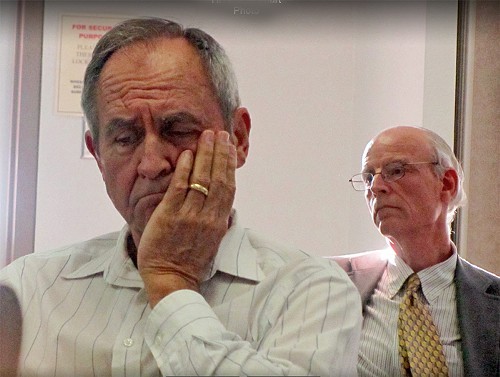
- JB
- Tommy Hart during TPC deliberations
The work of the Transition Planning Commission, going forward, is bound to be affected somewhat by the astonishing news last Friday that TPC member Tommy Hart, a former Shelby County Commissioner, had been arrested on charges of embezzling thousands of dollars of prize money contributed by bowlers competing in a tournament at a Southaven bowling establishment owned by Hart.
As a member of the TPC’s Educational Policy and Logistics Committee, Hart had been vocal in debate on the several key issues discussed at the TPC’s meeting of Thursday, May 3, just the day before. In general, Colliervillian Hart had served as one of the TPC’s spokespersons for a middle way and had been a mediating force between urban and suburban factions on the Commission.
`
There was a turning point, some weeks back, when the TPC engaged in a spirited discussion on whether (and to what extent) the TPC’s calculations on merger of Memphis City Schools and Shelby County Schools should take into account or even facilitate the plans of six suburban municipalities to extract themselves from the ongoing merger.
As much as anyone else, it was Hart who had shifted the focus of the group back to planning for a full merger involving the 150,000-odd students now enrolled in MCS and SCS. While acknowledging his suburban roots, he declared, “I’m wearing my TPC hat here,” and, in private conversations as well as public statements, he made clear his belief that there was no unanimity of opinion in his own municipality or in the other five — Bartlett, Germantown, Lakeland, Arlington, and Millington — where plans for separate schools system were going forward.
Though it has in the several months of its activity evolved a preliminary merger plan (called “Multiple Achievement Paths”) that would extend maximum autonomy to Memphis and suburban schools, as well as to new charter schools and a state-administered Achievement School District for “failing schools,” the TPC has kept itself focused on the ultimate goal of true consolidation.
Last Thursday’s meeting of the TPC, likely Hart’s last, was probably the first one in a while that made no reference at all, even obliquely, to the looming prospect of an organized breakaway from a unified school system by the suburban municipalities. That was something of an irony, given that state Senator Mark Norris (R-Collierville) had in the preceding week willed (and wiled) enabling legislation into being for the suburbs.
What happened last week was elaborate discussion by TPC members concerning the details of meshing the existing educational policies and logistical strategies of MCS and SCS — even to the details of transportation fleets and bell times. Everything was based on the presumption of having to plan for a system covering the whole of Shelby County.
Asked after last week’s meeting about the apparent anomaly involved in the TPC’s focusing on the elaborate aspects of a whole-county merger plan while the General Assembly had opened the lid early for the suburban separatist movement, both TPC chair Barbara Prescott and Richard Holden, co-chair of the TPC’s Educational Policy and Logistics Committee, downplayed the difficulty of translating the Commission’s plans into a smaller focus for a system that wouldn’t include the 50,000-odd suburban students.
Both Prescott and Holden indicated the changes, if necessary, would be adjustments of scale, but the earlier discussions Thursday had seemed to emphasize qualitative as well as quantitative differences between MCS and SCS, presenting an apples-vs.-oranges scenario — arguably as hard to disentangle at a later point as to combine in the first place.
Meanwhile, there was an ex post facto feel to the current line being vended by state Sen. Norris concerning what had been the intentions of the original 2011 bill, popularly known as Norris-Todd and referred to by himself, more formally, as Public Chapter One. Speaking on the WKNO-TV program “Behind the Headlines” last weekend, Norris suggested that the intent of his bill had always been to allow the Shelby County suburbs to prepare themselves for an early exit from merger — to the extent of extricating themselves altogether before that merger even took place.
If so, such an intention was not spoken to in extensive floor discussion on the bill, the final clause of which allowed for the lifting, in Shelby County only, of an existing state ban on new municipal or special school districts after the completion of MCS-SCS merger in August 2013.
No legal authority seems to have interpreted the bill, which became law when signed by Governor Bill Haslam, in the way that Norris is now suggesting — not state Attorney General Robert Cooper, who ruled in March that the suburbs could take no advance steps until August 2013, and not presiding U.S. District Judge Hardy Mays, whose qualified approval last year of the Norris-Todd bill for planning purposes explicitly excluded the issue of new school districts as not “ripe” until merger had been effected.
Hence the very need for new legislation for Norris — specifically HB1104/SB1923, which, as amended, would fill in the blanks left by Norris-Todd and allow Shelby County’s six suburban municipalities to proceed with enabling referenda on independent districts this year.
The immediate response of Governor Haslam, who had urged that no new legislation be rushed before the TPC could complete its work, was that it was not a “given” that he would sign the new bill but that it was unlikely he would veto it. Flash: He said Tuesday he anticipates signing it. End of that none-too-susenseful interlude. As for Judge Mays? He will likely be heard from in the near future.